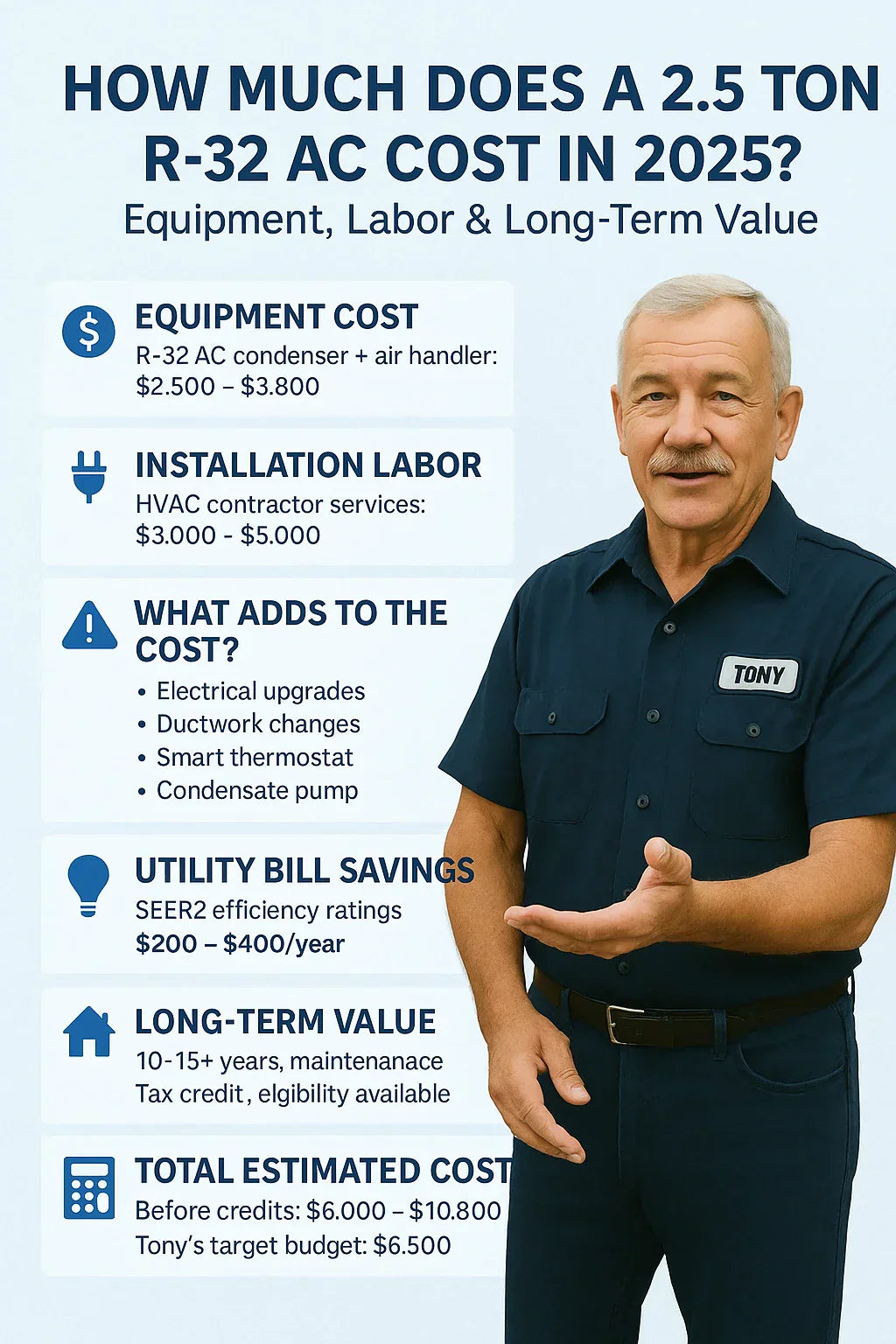Equipment, Labor & Long-Term Value Explained for Homeowners Like Tony
If you're like Tony—an experienced homeowner ready to replace an aging AC unit—you want answers before committing to a new system. The question on your mind: What will it really cost to install a 2.5 ton R-32 air conditioner in 2025? The answer depends on multiple factors: the unit itself, installation labor, necessary upgrades, and the potential for long-term savings.
In this comprehensive guide, we’ll break down every aspect of the cost—from upfront equipment pricing to the real-world efficiency savings. You’ll also hear Tony’s take on why switching to R-32 refrigerant makes financial and environmental sense.
🧊 What Is a 2.5 Ton R-32 AC System?
A Quick Refresher for First-Time Buyers
A 2.5 ton air conditioning system delivers approximately 30,000 BTUs of cooling power. This is typically ideal for homes between 1,200 to 1,600 square feet, depending on your local climate, insulation, and layout. The switch to R-32 refrigerant—a newer, more eco-friendly option than R-410A—makes these systems more sustainable and energy-efficient.
🔗 Learn more about R-32 refrigerant benefits from Daikin
💵 How Much Does the Equipment Cost?
The Core of the Expense
In 2025, the average price range for a 2.5 ton R-32 AC system is:
| Type | Estimated Cost (USD) |
|---|---|
| Basic R-32 AC Condenser | $1,500–$2,000 |
| R-32 Air Handler/Coil | $800–$1,200 |
| Matched System Package | $2,300–$3,200 |
🛒 Prices vary depending on:
-
Brand (e.g., Goodman, Amana, Lennox)
-
Compressor type (single-stage vs. two-stage)
-
SEER2 efficiency ratings
🛠️ Labor & Installation Costs
What Will the Pros Charge?
Labor can account for 40–60% of the total installation price. Here's a breakdown:
| Service Type | Typical Cost |
|---|---|
| Standard Installation | $1,800–$3,000 |
| New Ductwork (if needed) | $2,000–$5,000 |
| Electrical Upgrade (panel, outlet) | $500–$1,500 |
| Permit Fees & Inspection | $100–$300 |
In total, expect to pay $4,000–$7,500 installed if no ductwork is required. Full replacements with ducting can push the project above $10,000.
🔗 See estimates on HVAC Installation Cost Guide
🧾 Don’t Forget the “Hidden” Costs
Add-Ons That Might Affect Your Budget
Tony didn’t realize until his quote came in that several extras were involved. Here’s what you might also need:
-
Thermostat Upgrade: $100–$300
-
Wall sleeve, brackets, or pads: $50–$150
-
Condensate drain pump: $100–$250
-
Refrigerant line set (for new install): $150–$500
-
Disposal of old unit: $50–$150
🔗 Learn what to expect from HVAC.com's full installation guide
🌡️ SEER2 Ratings and Energy Efficiency
Real Savings Over the Life of the System
The SEER2 (Seasonal Energy Efficiency Ratio 2) rating measures how efficiently an AC system performs under stricter testing conditions. R-32 systems typically offer higher SEER2 ratings than older R-410A models due to:
-
Lower global warming potential (GWP)
-
Better heat exchange efficiency
-
Improved refrigerant flow characteristics
| System Type | SEER2 Rating | Est. Annual Energy Cost* |
|---|---|---|
| Legacy R-22 (10 SEER) | ~10 | $1,000+ |
| Older R-410A (13–14 SEER) | 13.0–14.3 | ~$750–$850 |
| R-32 Modern System (15–17) | 15.2–17.0 | ~$600–$700 |
*Assuming 2,000 cooling hours/year at $0.15/kWh
🔗 See Energy Star’s guide to SEER2
💡 Incentives, Rebates & Tax Credits in 2025
R-32 Systems Qualify!
One reason Tony opted for an R-32 model? Incentives.
✅ Federal Tax Credit (25C): Up to $600 for qualified AC units
✅ State Rebates: Vary by ZIP code
✅ Utility Rebates: Often $100–$500 for high-efficiency units
✅ Manufacturer Promotions: Some brands offer seasonal discounts
🔗 Use DSIRE to search rebates by ZIP code
📈 Long-Term Value & ROI
It’s Not Just About Upfront Cost
Let’s run the math for a system Tony paid $6,000 to install in 2025:
| Year | Energy Bill Savings | Notes |
|---|---|---|
| 1 | $200–$400 | Compared to old 10 SEER unit |
| 5 | $1,000–$1,600 | Lower repair risk too |
| 10 | $2,000–$3,500+ | Payback fully achieved |
With proper maintenance, your R-32 AC could last 15–20 years, and your utility savings can offset a large portion of the total installation cost.
🔗 Read Consumer Reports: How to Buy an Energy-Efficient Air Conditioner
🧰 Tony’s Pro Tips Before You Buy
“Don’t just look at sticker price. Ask about ducting, permits, and if your panel is ready for the load. I almost missed the fact that my 200-amp panel needed a new breaker setup.”
— Tony, Homeowner in Houston, TX
Tony recommends:
-
Comparing at least 3 quotes
-
Asking if the line set can be reused
-
Checking permit requirements in your area
-
Making sure you get a matched R-32 system (not mixing refrigerants!)
✅ Final Verdict: Is It Worth It?
Yes—if:
-
You want a future-ready, refrigerant-compliant system
-
You’re upgrading from a 10–14 SEER legacy system
-
You care about long-term energy savings
-
You qualify for rebates or tax credits
A 2.5 ton R-32 AC system might cost a bit more upfront, but over the course of a decade or more, it pays for itself in lower bills, fewer repairs, and a smaller environmental footprint.
📌 Summary: What Tony Learned
| Category | Key Info |
|---|---|
| Upfront Cost | $4,000–$7,500 (typical installed range) |
| SEER2 Rating | 15.2–17.0 for high-efficiency R-32 units |
| Rebates | Up to $600 federal, plus state/local |
| Annual Energy Savings | $200–$400 vs. older systems |
| ROI Timeline | 5–8 years, with proper usage |
In the next topic we will know more about: Single Stage vs. Two Stage R-32 ACs: Which One Is Better for Tony’s Home?







